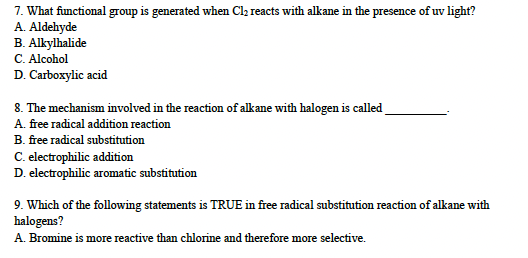7. What functional group is generated when Cl₂ reacts with alkane in the presence of uv light? A. Aldehyde B. Alkylhalide C. Alcohol D. Carboxylic acid 8. The mechanism involved in the reaction of alkane with halogen is called A. free radical addition reaction B. free radical substitution C. electrophilic addition D. electrophilic aromatic substitution 9. Which of the following statements is TRUE in free radical substitution reaction of alkane with halogens? A. Bromine is more reactive than chlorine and therefore more selective.
7. What functional group is generated when Cl₂ reacts with alkane in the presence of uv light? A. Aldehyde B. Alkylhalide C. Alcohol D. Carboxylic acid 8. The mechanism involved in the reaction of alkane with halogen is called A. free radical addition reaction B. free radical substitution C. electrophilic addition D. electrophilic aromatic substitution 9. Which of the following statements is TRUE in free radical substitution reaction of alkane with halogens? A. Bromine is more reactive than chlorine and therefore more selective.
Chemistry
10th Edition
ISBN:9781305957404
Author:Steven S. Zumdahl, Susan A. Zumdahl, Donald J. DeCoste
Publisher:Steven S. Zumdahl, Susan A. Zumdahl, Donald J. DeCoste
Chapter22: Organic And Biological Molecules
Section: Chapter Questions
Problem 2RQ
Related questions
Question

Transcribed Image Text:7. What functional group is generated when Cl₂ reacts with alkane in the presence of uv light?
A. Aldehyde
B. Alkylhalide
C. Alcohol
D. Carboxylic acid
8. The mechanism involved in the reaction of alkane with halogen is called
A. free radical addition reaction
B. free radical substitution
C. electrophilic addition
D. electrophilic aromatic substitution
9. Which of the following statements is TRUE in free radical substitution reaction of alkane with
halogens?
A. Bromine is more reactive than chlorine and therefore more selective.

Transcribed Image Text:B. Chlorine is more reactive than bromine and therefore more selective.
C. Bromine is less reactive than chlorine and therefore more selective.
D. Chlorine is less reactive than bromine and therefore more selective.
Expert Solution
This question has been solved!
Explore an expertly crafted, step-by-step solution for a thorough understanding of key concepts.
Step by step
Solved in 3 steps with 3 images

Knowledge Booster
Learn more about
Need a deep-dive on the concept behind this application? Look no further. Learn more about this topic, chemistry and related others by exploring similar questions and additional content below.Recommended textbooks for you

Chemistry
Chemistry
ISBN:
9781305957404
Author:
Steven S. Zumdahl, Susan A. Zumdahl, Donald J. DeCoste
Publisher:
Cengage Learning

Chemistry: An Atoms First Approach
Chemistry
ISBN:
9781305079243
Author:
Steven S. Zumdahl, Susan A. Zumdahl
Publisher:
Cengage Learning


Chemistry
Chemistry
ISBN:
9781305957404
Author:
Steven S. Zumdahl, Susan A. Zumdahl, Donald J. DeCoste
Publisher:
Cengage Learning

Chemistry: An Atoms First Approach
Chemistry
ISBN:
9781305079243
Author:
Steven S. Zumdahl, Susan A. Zumdahl
Publisher:
Cengage Learning


Chemistry & Chemical Reactivity
Chemistry
ISBN:
9781133949640
Author:
John C. Kotz, Paul M. Treichel, John Townsend, David Treichel
Publisher:
Cengage Learning

Chemistry & Chemical Reactivity
Chemistry
ISBN:
9781337399074
Author:
John C. Kotz, Paul M. Treichel, John Townsend, David Treichel
Publisher:
Cengage Learning

Chemistry by OpenStax (2015-05-04)
Chemistry
ISBN:
9781938168390
Author:
Klaus Theopold, Richard H Langley, Paul Flowers, William R. Robinson, Mark Blaser
Publisher:
OpenStax